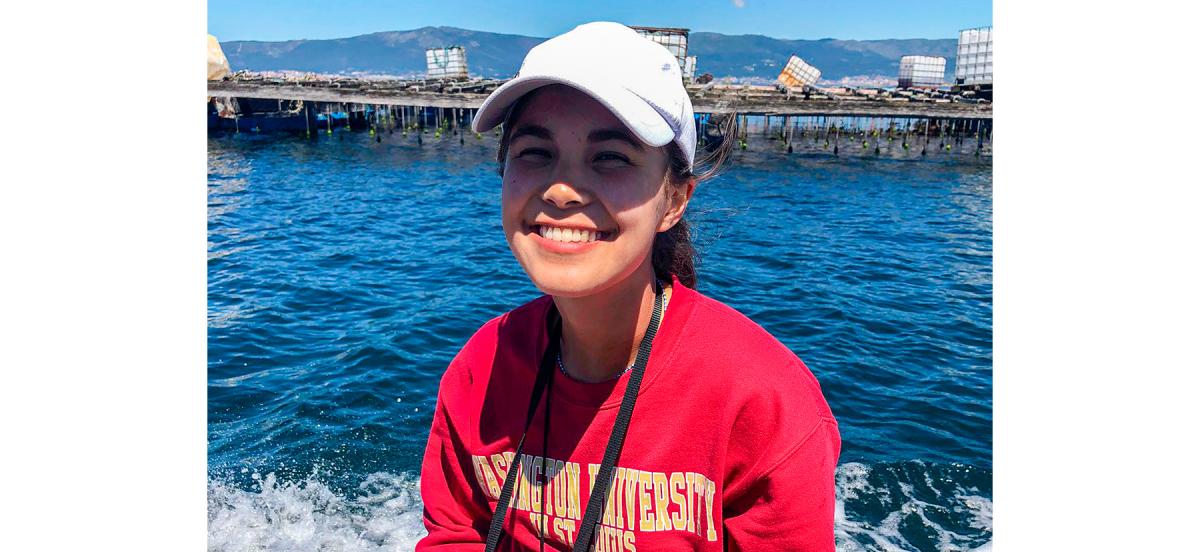Summer Centered: Annemarie Wood '23 Dives Into Dolphin Studies

Annemarie Wood '23 is studying dolphins and their relationships with their ecosystems at the Bottlenose Dolphin Research Institute in O Grove, Spain.
Details
The biology major is studying dolphins and the ecosystems they call home at the Bottlenose Dolphin Research Institute in Spain.
Beneath the surface of the ocean, entire ecosystems thrive and teem with life. Annemarie Wood '23 is spending her summer studying one of them and its residents. With the support of the Koshland Integrated Natural Sciences Center, the biology major, who is minoring in environmental studies, is working at the Bottlenose Dolphin Research Institute in O Grove, Spain, located in the country's Galica region.
Wood splits her research time between field and lab work. In the field, both on land and in water, she conducts surveys quantifying marine traffic, wildlife presence (particularly bottlenose dolphins and other cetaceans), and the effects of environmental and climate conditions on these factors.
“Each person on the team has a role, for example counting and categorizing the types of fishing boats in the area, or writing down whatever social behavior is exhibited by the dolphins,” she said. The team rotates roles regularly, so these tasks often fall to her. In addition, she often records her present geographic position and the weather conditions, to learn how it affects dolphin movement.
In the lab, Wood uses a geographic information system (GIS) to map distributions of bottlenose dolphins and other cetaceans. In doing so, she is looking to establish a connection between the presence of wildlife and factors such as chlorophyll concentrations. Often, she and her fellow student researchers, of whom there are 20 from countries around the world, present their work to each other.
Chlorophyll concentration is particularly important, as the presence of chlorophyll a can be an indicator of a harmful algal bloom (HAB). Wood is additionally studying how cetacean presence is affected by HABs.
The dual setting of the internship was especially appealing to Wood. “I liked that this internship offered research experience both in the field and in the lab,” she said. "I don’t have that much experience conducting research in the field yet, and I really enjoy working outside.”
Additionally, Wood is interested in conservation biology as a possible career path. On campus, she has taken marine science classes, and she works in the biogeochemistry lab of Professor of Environmental Studies and Chemistry Helen White. This internship allows her to explore further.
“Most of these classes related more to the chemical and molecular side of marine science, so I wanted to get some more experience with conservation biology research,” she said. “I’m also really interested in researching anthropogenic impact on the environment, especially the ocean, and I thought this internship offered a great way to get an idea of what working in conservation biology would be like.”
At the research institute, Wood has had the opportunity to work with Séverine Methion and Ph.D. candidates in the field. These collaborations have not only helped her gain data analysis skills by using software such as QGIS and R Studio, but have also expanded her career horizons.
“So far I’ve learned a lot about the reality of having a career in marine biology research, as well as the local conservation situation and the importance of documenting changes in distribution and behavior over time in an area that has such a high amount of interaction between humans and wildlife,” she said.
Outside work, Wood has been spending her time outdoors, exploring the national parks of Spain with her fellow interns.
“Summer Centered” is a series exploring our students’ campus-supported summer work.



